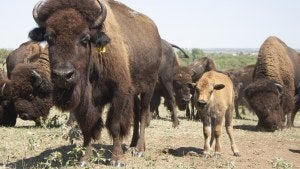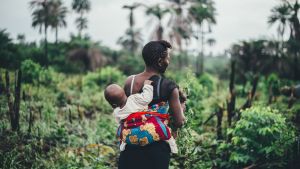Tribal Solutions, Rat Infestation, and Baby Food
Check out our roundup of the week's top news and research in food, agriculture, and global development.

Top Story
The Newest Contraband: Eggs
US Customs and Border Protection agents across the United States-Mexico border are reporting a record number of encounters with people attempting to smuggle eggs into the country. The rise in smuggling encounters comes as the price of eggs in the United States soared 60 percent in December year-over-year, averaging $4.25 a dozen. In contrast, Mexico’s price for a kilogram of eggs—more than a dozen jumbo eggs—is between $1.59 and $2.71. Customs and Border Protection is warning the public not to bring eggs or poultry across international borders, otherwise they could face monetary penalties.
Council Insights
Tribal Solutions
“Tribes and Tribal citizens across the country are stepping up and crafting innovative solutions to meet their community’s needs, as they have done since time immemorial,” writes the Indigenous Food and Agriculture Initiative’s Mary Belle Zook. “It is vital that federal agricultural policy opportunities continue expanding as well to provide greater support for these Tribally-led endeavors and choices like self-determination and self-governance.” Read the full blog post.
 Food and Agriculture
Food and Agriculture
Food & Agriculture
Brazil’s Humanitarian Crisis
Brazil has airlifted starving Yanomami tribal people out of the Amazon rainforest to receive urgent treatment. This comes after Brazil’s government declared a medical emergency in the country’s largest Indigenous reserve due to the revelations that hundreds of Yanomami children died from malnutrition and drinking water contaminated with mercury. The new Lula government has linked the deaths to illegal gold mining and has accused the previous government of committing genocide against the tribe.
Farmers Feeling Brexit
The UK just announced a new funding scheme to reward farmers who protect the environment, from conserving hedgerows to renouncing insecticide. The environmental land management schemes cost upwards of £2.4 billion annually and are meant to serve as the post-Brexit replacement for EU-style subsidies. This payment plan comes as farms across the UK report that over 22 million pounds of fruits and vegetables went unharvested in 2022 due to post-Brexit labor shortages.
Rat Infestation
Sugarcane growers in Australia’s northern Queensland are facing significant crop losses due to an infestation of rats. The infestation follows heavy rains since Christmas, which left sugarcane fields too wet to harvest. Australia is a major exporter of raw and refined sugar, and about 95 percent of the country’s sugar is grown in Queensland. The rats are also posing a health risk, with people encountering rat urine at risk for a Leptospirosis infection, which can lead to kidney or liver failure.
Deeper Dive
Why Are Egg Prices Skyrocketing?
The price of eggs has skyrocketed over recent months, up 138 percent year-over-year in December. Avian flu, a highly contagious strain of the influenza virus that infects birds and humans, is to blame. The virus has wiped out 58 million birds in poultry farms across the United States. There is a similar story worldwide, with Malaysia and Bulgaria having to cull thousands in their poultry populations.
Resilience
Eating Enzymes
BASF and Cargill announced an expanded partnership to bring enzyme-based products and solutions to the animal feed market. With the United States as the latest country to be added to the joint development, the partnership will build on previous collaboration across Argentina, Brazil, Mexico, Portugal, Spain, the Middle East, and Africa. It is designed to help improve productivity and sustainability, and will address cost challenges for consumers.
DC Report
FDA Takes On Baby Food
The FDA issued a draft proposal limiting lead amounts in processed baby foods. The proposed limits range from 10 to 20 parts per billion, and include baby foods like puréed fruits, yogurts, and cereals. If adopted, the agency expects the proposed limits to reduce dietary lead exposure by about 25 percent. This draft proposal comes after the FDA recommended limiting lead levels in juice and inorganic arsenic in infant rice cereal last year.
Big Actors
Gender Hunger Gaps
The emerging climate crisis is creating a growing gender hunger gap, seen in the prioritization of men’s diets over women. The World Food Programme predicts climate change will continue to produce environmental shocks that disproportionately affect women, children, and Indigenous people, leaving millions hungry. To advance human and environmental health, communities must promote gender equality and women’s empowerment. Read more in our Global Food for Thought Blog A Gender-Responsive Approach to Natural Resources.
 Food and Agriculture
Food and Agriculture
Trade & Commodities
Corn Battles
USTR and USDA Officials raised “grave concerns” over Mexico’s push to ban human edible GMO corn from entering the country, the latest in a months-long fight. Mexico had proposed extending the moratorium on US biotech corn until 2025. The statement argued the move threatens to disrupt billions of dollars in bilateral agricultural trade and stifle progress on climate and food security goals. With the United States accounting for most Mexican corn imports, USTR is considering taking formal legal action under the US-Mexico-Canada Agreement.
Ask an Expert
Can farmers utilize agtech to enhance sustainability without widening existing technological divides between low- to middle-income countries (LMICs) and high-income countries, or are technological divides an inevitable consequence?
"Farmers are already using tech solutions to improve their farm businesses in so many ways, including simple technologies we may not consider agtech, like coordinating input purchases or sales via WhatsApp. I worry less about a generalized divide between farmers in high and low-and-middle income countries and more about the gender divide within LMICs. Recent evidence from GSMA on the digital gender divide suggests the divide has been pretty static in most places, though widening in South Asia and always worse for rural people than urban dwellers. So, agtech is operating in this wider context and needs to be aware.
To limit the risk of exacerbating inequity and contribute to a more equitable expansion of agtech, I see three areas of action: 1) we need collective investments in closing fundamental digital gaps across equipment access, broadband and confidence for the most marginalized producers, especially for rural women; 2) we need to ensure product designers are trained in assessing user needs and existing behaviors around tech adoption so they can design useful and inclusive products; and 3) we need to advocate for tech and policies that protect individual privacy and agency over data about them."
— Nonresident Fellow Alesha Miller


Have a question about food and agriculture? Ask one of our experts at the Center on Global Food and Agriculture to get an answer in next week's Global Food for Thought!
Council Events
Did you miss one of our previous livestreams? Don't worry! They are all available on our website to watch at any time.
Other Upcoming Events
Food Matters Chicago Think Tank
Date: January 31
Time: 8:30 a.m. – 12:00 p.m. CT
The Future of Food and Agriculture: Drivers and Triggers for Transformation
Date: February 1
Time: 10:00 – 11:15 a.m. ET
Taking Stock of Africa’s Agrifood Processing Sector
Date: February 9
Time: 8:00 – 9:30 a.m. ET
46th Session of the IFAD Governing Council
Date: February 14 – 15
Green and Growing Summit
Date: May 6
Time: 8:00 a.m. – 3:30 p.m. CT
Land Acknowledgement Statement
The Center on Global Food and Agriculture recognizes it occupies the ancestral land of the Kiikaapoi, Peoria, Kaskaskia, Bodwéwadmi, and Myaamia people. Indigenous communities around the world disproportionately experience the pressures of climate change, global conflicts, and the COVID-19 pandemic, while simultaneously stewarding 80 percent of the world’s biodiversity. These Indigenous tribes and nations are the original owners of this land and continue to be systemically erased by policies and practices that ignore their histories. To learn more about Indigenous foodways and practices, check out our 2022 blog series "Stewardship, Sovereignty, and Solutions."
Related Content
- Embracing Dandelions as Food and Medicine
- Going Beyond Regenerative Agriculture on Tribal Lands
- Expanding "638" to Enhance Native American Food Sovereignty
- Flavors and Culture: Food Systems Through Indigenous Women's Eyes
- A Thanksgiving Legacy: Fighting for Indigenous Food Sovereignty
- Native Food Sovereignty: Strengthening Connection to Culture
- Reconnecting to Indigenous Food Sovereignty Values and Practices
- Embracing Interconnectedness: How Indigenous Foodways Can Save Us




